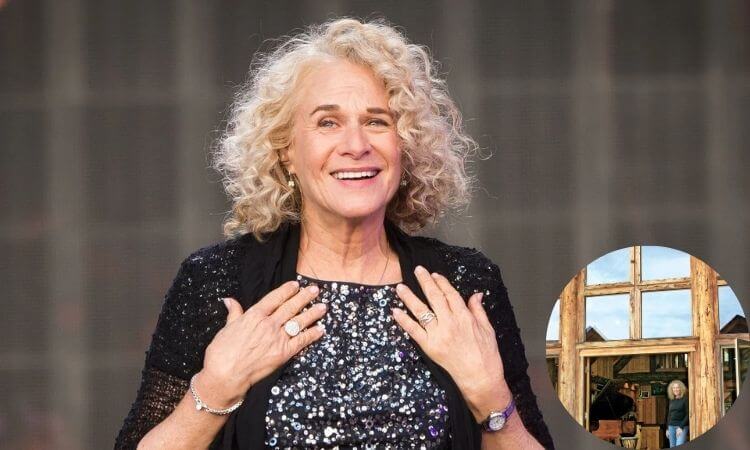Table of Contents
How much is Carole King Net Worth in 2025?
Carole King, born on February 9, 1942, in Manhattan, New York, is an iconic American singer-songwriter whose influence spans over six decades. She began her career as a songwriter at the legendary Brill Building in the 1960s, where she co-wrote a string of hits with her then-husband, Gerry Goffin. Together, they penned classics like “Will You Love Me Tomorrow” (The Shirelles), “The Loco-Motion” (Little Eva), and “(You Make Me Feel Like) A Natural Woman” (Aretha Franklin). Her ability to craft heartfelt lyrics and memorable melodies established her as one of the most successful songwriters of the era.
King’s career reached new heights with the release of her 1971 solo album, Tapestry. The album became a landmark in music history, winning four Grammy Awards and featuring timeless tracks like “You’ve Got a Friend,” “It’s Too Late,” and “I Feel the Earth Move.” Beyond her music, Carole King is an environmental activist and author. Her contributions to music have earned her numerous accolades, including induction into the Rock and Roll Hall of Fame as both a songwriter and a performer. Her enduring legacy as a pioneer in pop and singer-songwriter music continues to inspire artists worldwide.
- Full Name: Carole Joan King
- Born: February 9, 1942, Manhattan, New York
- Profession: Singer-songwriter, pianist
- Breakthrough Album: Tapestry (1971)
- Famous Hits: “You’ve Got a Friend,” “(You Make Me Feel Like) A Natural Woman,” “It’s Too Late”
- Songwriting Partner: Gerry Goffin (ex-husband)
- Major Achievements: Over 400 songs written, inducted into the Rock and Roll Hall of Fame twice, multiple Grammy Awards
- Legacy: Iconic figure in pop, rock, and folk music; influential female songwriter; advocate for environmental and social causes
- Notable Ventures: Beautiful: The Carole King Musical on Broadway
Carole King’s Net Worth
Carole King is an American singer-songwriter with a net worth of $100 million, renowned as one of the most commercially successful female songwriters of all time. She achieved widespread recognition with her 1971 album Tapestry, which stayed on the U.S. charts for nearly six years. Over the course of her career, King has released more than 20 solo albums and has been inducted into the Rock and Roll Hall of Fame twice. She has also earned numerous prestigious awards, including multiple Grammys.
Having written or co-written over 400 songs recorded by more than 1,000 artists, King’s songwriting career was most successful during the 1960s when she collaborated with her former husband, Gerry Goffin. Together, they co-wrote many chart-topping hits, including her first #1 single, “Will You Love Me Tomorrow,” when she was just 18 years old.
DO NOT MISS: How much is Frances Bean Cobain Net Worth in 2025?
Early Life and Education
Carole King was born on February 9, 1942, in Manhattan, New York, to a Jewish family. Her birth name was Carole Joan Klein. She showed an early interest in music, learning to play the piano at a young age. Raised in Brooklyn, King attended James Madison High School, where she met her future songwriting partner, Gerry Goffin. They both shared a passion for music and soon after meeting, they began writing songs together.
King later attended Queens College, but her education was cut short when she decided to pursue a career in music. At the age of 16, she signed her first music contract, which set her on the path to becoming one of the most influential songwriters in the music industry. Despite her formal education being brief, her natural talent and dedication to songwriting helped her achieve success early in her career.
Career Beginnings
Carole King’s career began in the early 1960s when she started working at the famous Brill Building in New York City, a hub for songwriters and music publishers. At just 17, she signed her first professional songwriting contract, and her work quickly gained attention. It was at the Brill Building that she met her future husband, Gerry Goffin, and together they formed one of the most successful songwriting partnerships of the era. They wrote a string of hits for various artists, including the chart-topping single “Will You Love Me Tomorrow” by The Shirelles, which became King’s first major hit when she was only 18.
Their songwriting collaborations flourished throughout the 1960s, producing numerous classic songs that became staples of the era, such as “The Loco-Motion” by Little Eva and “(You Make Me Feel Like) A Natural Woman” by Aretha Franklin. While King’s early work was primarily behind the scenes as a songwriter, her exceptional talent and ability to craft deeply emotional, memorable songs laid the foundation for her later success as a solo artist.
Breakthrough with “Tapestry”
Carole King’s breakthrough as a solo artist came with the release of her 1971 album Tapestry. The album marked a turning point in her career, showcasing her as not just a songwriter but a powerful performer as well. Tapestry was a critical and commercial success, staying on the U.S. charts for nearly six years and becoming one of the best-selling albums of all time. It included iconic tracks such as “It’s Too Late,” “I Feel the Earth Move,” and “You’ve Got a Friend,” the latter of which became a major hit for both King and James Taylor.
The album won four Grammy Awards, including Album of the Year, and solidified King’s place as one of the most influential artists of the 1970s. Tapestry also marked a shift in popular music, as it blended folk, pop, and soft rock, resonating deeply with listeners and earning King a loyal fan base. The success of Tapestry not only boosted her solo career but also established her as a trailblazer for female singer-songwriters in the music industry.
Further Albums in the 70s
Following the immense success of Tapestry, Carole King continued to build on her solo career throughout the 1970s with several more albums that further solidified her place in music history. In 1972, she released Music, which, while not as commercially successful as Tapestry, still garnered critical acclaim and featured hits like “Been to Canaan.” The album explored more diverse musical styles, including jazz and pop, showcasing King’s versatility as an artist.
Her 1974 album Wrap Around Joy brought King back to the top of the charts with the hit single “Jazzman,” which became one of her biggest hits of the decade. This album’s success demonstrated her ability to maintain relevance in a rapidly changing musical landscape. In 1975, she released Really Rosie, an album for a children’s musical based on Maurice Sendak’s stories, which, though a departure from her usual style, further highlighted her creativity and range.
King’s 1976 album Thoroughbred continued her streak of strong releases, featuring songs like “High Out of Time” and “Been to Canaan.” Throughout the 1970s, Carole King’s music evolved, reflecting both personal and professional growth. Though her albums in this period didn’t always match the massive success of Tapestry, her influence continued to grow, and her songwriting and performance remained beloved by fans and respected by critics.

Later Albums
In the 1980s and beyond, Carole King continued to release albums that reflected her evolving musical style while maintaining her status as an influential figure in the music industry. One of her notable releases from the 1980s was Pearls: Songs of Goffin and King (1980), which was a tribute to her songwriting partnership with Gerry Goffin. The album featured re-recorded versions of their most famous songs, such as “Will You Love Me Tomorrow” and “The Loco-Motion.” While it wasn’t a commercial breakthrough, it highlighted the enduring impact of her early work.
Throughout the 1990s and 2000s, King released several more albums, including Color of Your Dreams (1993), Live at the Troubadour (2007) – a live album that featured her performance with James Taylor – and A Holiday Carole (2011), a collection of Christmas songs. Though these albums did not match the critical or commercial success of her earlier works, they still showcased her continued artistic growth and ability to connect with audiences.
In 2014, King released Lowes and Fish, an album that focused on more contemporary sounds, blending folk and pop with a modern twist. Even in her later years, Carole King’s musical output remained diverse, touching on personal themes, reflecting changes in the music industry, and continuing to inspire new generations of artists. While the 21st century saw fewer releases, her place in music history remained firmly cemented, and her contributions to the industry continued to be celebrated.
Other Musical Ventures
In addition to her successful solo albums, Carole King has been involved in various other musical ventures that have further cemented her legacy as one of the most influential figures in popular music.
One of her most significant ventures outside of her own solo career was her work on Broadway. In 2014, her life and music were celebrated in the Tony Award-winning musical Beautiful: The Carole King Musical. The show chronicled her early years, her songwriting partnership with Gerry Goffin, and her journey to becoming a solo artist. The musical’s success not only introduced her music to a new generation but also earned King a special Tony Award for her contributions to the musical theater world.
King has also been a significant advocate for environmental and social causes. She has used her platform to raise awareness about climate change, environmental preservation, and various human rights issues. Her activism includes participating in environmental campaigns and writing a book, A Natural Woman, which details her experiences in both her personal and professional life.
In terms of collaborations, Carole King has worked with a wide range of artists across various genres. She co-wrote “Up on the Roof,” a hit for The Drifters, and collaborated with artists like James Taylor, with whom she toured and released albums such as Live at the Troubadour. She also worked with the musical group The City and joined forces with legendary artists like Aretha Franklin, whose rendition of King’s song “(You Make Me Feel Like) A Natural Woman” became a defining anthem in soul and pop music.
King’s diverse ventures—spanning Broadway, activism, and collaborations—demonstrate her multifaceted career and enduring influence both in and beyond the music world.
Personal Life and Activism
Carole King’s personal life has been marked by both triumphs and challenges, reflecting her depth as an artist and individual. She has been married four times, with her most notable partnership being with songwriter Gerry Goffin. Together, they formed one of the most successful songwriting teams of the 1960s, creating timeless hits like “Will You Love Me Tomorrow” and “(You Make Me Feel Like) A Natural Woman.” The couple divorced in 1968, and King later married bass player Charles Larkey, with whom she had two children. She later married Rick Evers, who passed away in a tragic accident, and finally wed musical engineer and producer Rick Sorensen.
King is also a passionate advocate for environmental and social causes, using her platform to raise awareness about issues such as climate change, women’s rights, and human rights. In the 1970s, she became an outspoken environmental activist, working to protect natural resources and promote sustainability. She has been involved in campaigns to preserve open spaces and has supported various environmental organizations.
Beyond her environmental activism, King has been involved in a range of charitable activities, particularly those supporting women’s rights and social justice. Her activism is closely tied to her belief in the power of music to inspire change, and she has used her public visibility to amplify important social causes.
In her personal and public life, Carole King has consistently been an advocate for both artistic expression and social responsibility, blending her talents as a musician with a strong commitment to making the world a better place.
Legacy
Carole King’s legacy is one of profound influence and lasting impact on the music industry. As one of the most successful and revered singer-songwriters in history, she has shaped popular music through her timeless songs, powerful performances, and innovative contributions to the art of songwriting. With a career spanning over six decades, King not only revolutionized the role of women in music but also helped define the sound of pop, rock, and folk during the 1960s and 1970s. Her album Tapestry remains one of the best-selling albums of all time, solidifying her place in musical history.
King’s songwriting, both as a solo artist and in collaboration with her former husband, Gerry Goffin, has left an indelible mark on the music world. Together, they penned over 400 songs that have been recorded by more than 1,000 artists, producing countless chart-topping hits. Her songs, such as “You’ve Got a Friend,” “Will You Love Me Tomorrow,” and “(You Make Me Feel Like) A Natural Woman,” continue to resonate with audiences around the globe. Her influence extends beyond music, as she has been an advocate for environmental and social causes, using her platform to bring attention to issues like climate change, women’s rights, and human rights.
In recognition of her artistic and cultural contributions, Carole King has received numerous accolades, including multiple Grammy Awards, induction into the Rock and Roll Hall of Fame, and a special Tony Award for her role in the Broadway musical Beautiful: The Carole King Musical. King’s legacy as a groundbreaking artist and activist will continue to inspire future generations, making her an enduring icon in both the music world and beyond.
Conclusion
Carole King’s career has not only shaped the music industry but also left an indelible mark on the cultural landscape. From her early days as a prolific songwriter to her breakthrough as a solo artist with Tapestry, she revolutionized the role of women in music and became a beacon of creativity and resilience. Her timeless songs, impactful performances, and commitment to activism have earned her a place among the most influential figures in music history. Beyond her remarkable achievements in songwriting, King’s advocacy for environmental and social causes further exemplifies her legacy as a compassionate and socially responsible artist. Today, Carole King continues to inspire, her influence echoing through the generations of musicians and fans who cherish her contributions to the world of music and beyond.


